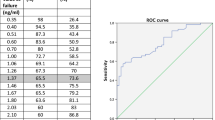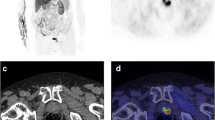Abstract
Purpose
The accuracy of positron emission tomography (PET)/CT with [11C]choline for the detection of prostate cancer is not well established. We assessed the dependence of [11C]choline maximum standardized uptake values (SUVmax) in the prostate gland on cell malignancy, prostate-specific antigen (PSA) levels, Gleason score, tumour stage and anti-androgenic hormonal therapy.
Methods
In this prospective study, PET/CT with [11C]choline was performed in 19 prostate cancer patients who subsequently underwent prostatectomy with histologic sextant analysis (group A) and in six prostate cancer patients before and after anti-androgenic hormonal therapy (bicalutamide 150 mg/day; median treatment of 4 months; group B).
Results
In group A, based on a sextant analysis with a [11C]choline SUVmax cutoff of 2.5 (as derived from a receiver-operating characteristic analysis), PET/CT showed sensitivity, specificity, positive predictive value, negative predictive value and accuracy of 72, 43, 64, 51 and 60%, respectively. In the patient-by-patient analysis, no significant correlation was detected between SUVmax and PSA levels, Gleason score or pathological stage. On the contrary, a significant (P < 0.05) negative correlation was detected between SUVmax and anti-androgenic therapy both in univariate (r 2 = 0.24) and multivariate (r 2 = 0.48) analyses. Prostate [11C]choline uptake after bicalutamide therapy significantly (P < 0.05) decreased compared to baseline (6.4 ± 4.6 and 11.8 ± 5.3, respectively; group B).
Conclusion
PET/CT with [11C]choline is not suitable for the initial diagnosis and local staging of prostate cancer. PET/CT with [11C]choline could be used to monitor the response to anti-androgenic therapy.




Similar content being viewed by others
References
Zeisel SH. Dietary choline: biochemistry, physiology, and pharmacology. Annu Rev Nutr 1981;1:95–121.
Kurhanewicz J, Vigneron DB, Hricak H, Narayan P, Carroll P, Nelson SJ. Three-dimensional H-1 MR spectroscopic imaging of the in situ human prostate with high (0.24–0.7-cm3) spatial resolution. Radiology 1996;198:795–805.
Ackerstaff E, Pflug BR, Nelson JB, Bhujwalla ZM. Detection of increased choline compounds with proton nuclear magnetic resonance spectroscopy subsequent to malignant transformation of human prostatic epithelial cells. Cancer Res 2001;61:3599–603.
Ramirez de Molina A, Rodriguez-Gonzalez A, Gutierrez R, Martinez-Pineiro L, Sanchez J, Bonilla F, et al. Overexpression of choline kinase is a frequent feature in human tumor-derived cell lines and in lung, prostate, and colorectal human cancers. Biochem Biophys Res Commun 2002;296:580–3.
Hara T, Kosaka N, Kishi H. PET imaging of prostate cancer using carbon-11-choline. J Nucl Med 1998;39:990–5.
de Jong IJ, Pruim J, Elsinga PH, Vaalburg W, Mensink HJ. Visualization of prostate cancer with [11C]choline positron emission tomography. Eur Urol 2002;42:18–23.
Kotzerke J, Prang J, Neumaier B, Volkmer B, Guhlmann A, Kleinschmidt K, et al. Experience with carbon-11 choline positron emission tomography in prostate carcinoma. Eur J Nucl Med 2000;27:1415–9.
Roivainen A, Forsback S, Gronroos T, Lehikoinen P, Kahkonen M, Sutinen E, et al. Blood metabolism of [methyl-11C]choline; implications for in vivo imaging with positron emission tomography. Eur J Nucl Med 2000;27:25–2.
Picchio M, Messa C, Landoni C, Gianolli L, Sironi S, Brioschi M, et al. Value of [11C]choline-positron emission tomography for re-staging prostate cancer: a comparison with [18F]fluorodeoxyglucose-positron emission tomography. J Urol 2003;169:1337–40.
Yoshida S, Nakagomi K, Goto S, Futatsubashi M, Torizuka T. [11C]choline positron emission tomography in prostate cancer: primary staging and recurrent site staging. Urol Int 2005;74:214–20.
Reske SN, Blumstein NM, Neumaier B, Gottfried HW, Finsterbusch F, Kocot D, et al. Imaging prostate cancer with [11C]choline PET/CT. J Nucl Med 2006;47:1249–54.
Scher B, Seitz M, Albinger W, Tiling R, Scherr M, Becker HC, et al. Value of 11C-choline PET and PET/CT in patients with suspected prostate cancer. Eur J Nucl Med Mol Imaging 2007;34:45–53.
Sutinen E, Nurmi M, Roivainen A, Varpula M, Tolvanen T, Lehikoinen P, et al. Kinetics of [11C]choline uptake in prostate cancer: a PET study. Eur J Nucl Med Mol Imaging 2004;31:317–24.
Schmid DT, John H, Zweifel R, Cservenyak T, Westera G, Goerres GW, et al. Fluorocholine PET/CT in patients with prostate cancer: initial experience. Radiology 2005;235:623–8.
Kwee SA, Coel MN, Lim J, Ko JP. Prostate cancer localization with 18fluorine fluorocholine positron emission tomography. J Urol 2005;173:252–5.
Farsad M, Schiavina R, Castellucci P, Nanni C, Corti B, Martorana G, et al. Detection and localization of prostate cancer: correlation of [11C]choline PET/CT with histopathologic step-section analysis. J Nucl Med 2005;46:1642–9.
Tyrrell CJ, Payne H, See WA, McLeod DG, Wirth MP, Iversen P, et al. Bicalutamide (‘Casodex’) 150 mg as adjuvant to radiotherapy in patients with localised or locally advanced prostate cancer: results from the randomised Early Prostate Cancer Programme. Radiother Oncol 2005;76:4–10.
Fluchter SH, Weiser R, Gamper C. The role of hormonal treatment in prostate cancer. Recent results. Cancer Res 2007;175:211–37.
Steuber T, Erbersdobler A, Graefen M, Haese A, Huland H, Karakiewicz PI. Comparative assessment of the 1992 and 2002 pathologic T3 substages for the prediction of biochemical recurrence after radical prostatectomy. Cancer 2006;106:775–82.
Namiki K, Rosser CJ. Neoadjuvant therapy and prostate cancer: what a urologist should know. Curr Opin Urol 2007;17:188–93.
Martorana G, Schiavina R, Corti B, Farsad M, Salizzoni E, Brunocilla E, et al. [11C]choline positron emission tomography/computerized tomography for tumor localization of primary prostate cancer in comparison with 12-core biopsy. J Urol 2006;176:954–60.
Kwee SA, Wei H, Sesterhenn I, Yun D, Coel MN. Localization of primary prostate cancer with dual-phase 18F-Fluorocholine PET. J Nucl Med 2006;47:262–9.
Okotie OT, Aronson WJ, Wieder JA, Liao Y, Dorey F, De KJ, et al. Predictors of metastatic disease in men with biochemical failure following radical prostatectomy. J Urol 2004;171:2260–4.
Chybowski FM, Keller JJ, Bergstralh EJ, Oesterling JE. Predicting radionuclide bone scan findings in patients with newly diagnosed, untreated prostate cancer: prostate specific antigen is superior to all other clinical parameters. J Urol 1991;145:313–8.
Kausik SJ, Blute ML, Sebo TJ, Leibovich BC, Bergstralh EJ, Slezak J, et al. Prognostic significance of positive surgical margins in patients with extraprostatic carcinoma after radical prostatectomy. Cancer 2002;95:1215–9.
Epstein JI, Carmichael MJ, Pizov G, Walsh PC. Influence of capsular penetration on progression following radical prostatectomy: a study of 196 cases with long-term followup. J Urol 1993;150:135–41.
Breeuwsma AJ, Pruim J, Jongen MM, Suurmeijer AJ, Vaalburg W, Nijman RJ, et al. In vivo uptake of [11C]choline does not correlate with cell proliferation in human prostate cancer. Eur J Nucl Med Mol Imaging 2005;32:668–73.
Yamaguchi T, Lee J, Uemura H, Sasaki T, Takahashi N, Oka T, et al. Prostate cancer: a comparative study of 11C-choline PET and MR imaging combined with proton MR spectroscopy. Eur J Nucl Med Mol Imaging 2005;32:742–8.
Oyama N, Akino H, Suzuki Y, Kanamaru H, Ishida H, Tanase K, et al. FDG PET for evaluating the change of glucose metabolism in prostate cancer after androgen ablation. Nucl Med Commun 2001;22:963–9.
Oyama N, Kim J, Jones LA, Mercer NM, Engelbach JA, Sharp TL, et al. MicroPET assessment of androgenic control of glucose and acetate uptake in the rat prostate and a prostate cancer tumor model. Nucl Med Biol 2002;29:783–90.
Oyama N, Ponde DE, Dence C, Kim J, Tai YC, Welch MJ. Monitoring of therapy in androgen-dependent prostate tumor model by measuring tumor proliferation. J Nucl Med 2004;45:519–25.
Hara T, Bansal A, DeGrado TR. Effect of hypoxia on the uptake of [methyl-3H]choline, [1–14C] acetate and [18F]FDG in cultured prostate cancer cells. Nucl Med Biol 2006;33:977–84.
Nakashima J, Imai Y, Tachibana M, Baba S, Hiramatsu K, Murai M. Effects of endocrine therapy on the primary lesion in patients with prostate carcinoma as evaluated by endorectal magnetic resonance imaging. Cancer 1997;80:237–41.
Padhani AR, MacVicar AD, Gapinski CJ, Dearnaley DP, Parker GJ, Suckling J, et al. Effects of androgen deprivation on prostatic morphology and vascular permeability evaluated with MR imaging. Radiology 2001;218:365–74.
Hellstrom M, Haggman M, Brandstedt S, de la Torre M, Pedersen K, Jarlsfeldt I, et al. Histopathological changes in androgen-deprived localized prostatic cancer. A study in total prostatectomy specimens. Eur Urol 1993;24:461–5.
Mueller-Lisse UG, Swanson MG, Vigneron DB, Hricak H, Bessette A, Males RG, et al. Time-dependent effects of hormone-deprivation therapy on prostate metabolism as detected by combined magnetic resonance imaging and 3D magnetic resonance spectroscopic imaging. Magn Reson Med 2001;46:49–57.
Davoodpour P, Bergstrom M, Landstrom M. Effects of 2-methoxyestradiol on proliferation, apoptosis and PET-tracer uptake in human prostate cancer cell aggregates. Nucl Med Biol 2004;31:867–74.
Swinnen JV, Verhoeven G. Androgens and the control of lipid metabolism in human prostate cancer cells. J Steroid Biochem Mol Biol 1998;65:191–8.
Agus DB, Golde DW, Sgouros G, Ballangrud A, Cordon-Cardo C, Scher HI. Positron emission tomography of a human prostate cancer xenograft: association of changes in deoxyglucose accumulation with other measures of outcome following androgen withdrawal. Cancer Res 1998;58:3009–14.
Yoshimoto M, Waki A, Obata A, Furukawa T, Yonekura Y, Fujibayashi Y. Radiolabeled choline as a proliferation marker: comparison with radiolabeled acetate. Nucl Med Biol 2004;31:859–65.
de Jong IJ, Pruim J, Elsinga PH, Vaalburg W, Mensink HJ. Preoperative staging of pelvic lymph nodes in prostate cancer by [11C]choline PET. J Nucl Med 2003;44:331–5.
Partin AW, Pearson JD, Landis PK, Carter HB, Pound CR, Clemens JQ, et al. Evaluation of serum prostate-specific antigen velocity after radical prostatectomy to distinguish local recurrence from distant metastases. Urology 1994;43:649–59.
Author information
Authors and Affiliations
Corresponding author
Rights and permissions
About this article
Cite this article
Giovacchini, G., Picchio, M., Coradeschi, E. et al. [11C]Choline uptake with PET/CT for the initial diagnosis of prostate cancer: relation to PSA levels, tumour stage and anti-androgenic therapy. Eur J Nucl Med Mol Imaging 35, 1065–1073 (2008). https://doi.org/10.1007/s00259-008-0716-2
Received:
Accepted:
Published:
Issue Date:
DOI: https://doi.org/10.1007/s00259-008-0716-2




